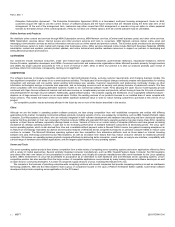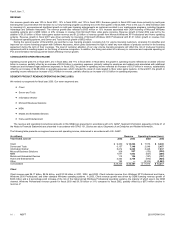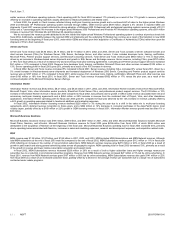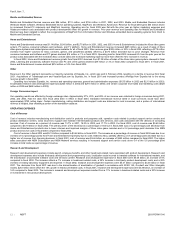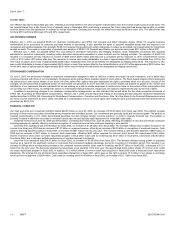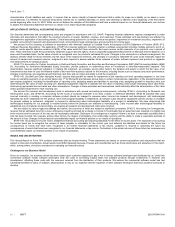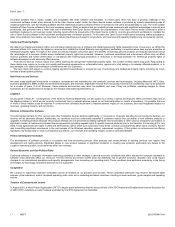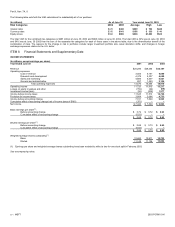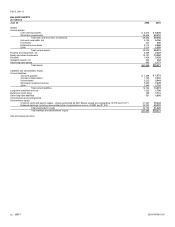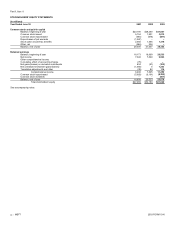Microsoft 2003 Annual Report Download - page 27
Download and view the complete annual report
Please find page 27 of the 2003 Microsoft annual report below. You can navigate through the pages in the report by either clicking on the pages listed below, or by using the keyword search tool below to find specific information within the annual report.Part II, Item 7,
MSFT 2003 FORM 10-K
14 /
Income Taxes
Our effective tax rate for fiscal 2003 was 32%, reflecting a one-time benefit in the second quarter of $126 million from the reversal of previously accrued taxes. The
tax reversal stems from a 9th Circuit Court of Appeals ruling in December 2002 overturning a previous Tax Court ruling that had denied tax benefits on certain
revenue earned from the distribution of software to foreign customers. Excluding this reversal, the effective tax rate would have been 33%. The effective tax rate
for fiscal 2001 and fiscal 2002 was 33% and 32%, respectively.
ACCOUNTING CHANGES
Effective July 1, 2001, we adopted SFAS 141, Business Combinations, and SFAS 142, Goodwill and Other Intangible Assets. SFAS 141 requires business
combinations to be accounted for using the purchase method of accounting. It also specifies the types of acquired intangible assets that are required to be
recognized and reported separate from goodwill. SFAS 142 requires that goodwill and certain intangibles no longer be amortized, but instead tested for impairment
at least annually. There was no impairment of goodwill upon adoption of SFAS 142. Goodwill amortization (on a pre-tax basis) was $311 million in fiscal 2001.
Effective July 1, 2000, we adopted SFAS 133, Accounting for Derivative Instruments and Hedging Activities, which establishes accounting and reporting
standards for derivative instruments, including certain derivative instruments embedded in other contracts and for hedging activities. The adoption of SFAS 133
resulted in a cumulative pre-tax reduction to income of $560 million ($375 million after-tax) and a cumulative pre-tax reduction to other comprehensive income
(OCI) of $112 million ($75 million after-tax). The reduction to income was mostly attributable to a loss of approximately $300 million reclassified from OCI for the
time value of options and a loss of approximately $250 million reclassified from OCI for derivatives not designated as hedging instruments. The reduction to OCI
was mostly attributable to losses of approximately $670 million on cash flow hedges offset by the reclassifications out of OCI of the approximately $300 million loss
for the time value of options and the approximately $250 million loss for derivative instruments not designated as hedging instruments.
STOCK-BASED COMPENSATION
On July 8, 2003, we announced changes in employee compensation designed to help us continue to attract and retain the best employees, and to better align
employee interests with those of our shareholders. Employees will be granted Stock Awards instead of stock options. The Stock Award program offers employees
the opportunity to earn actual shares of our stock over time, rather than options that give employees the right to purchase stock at a set price. As part of the
changes, we announced that a significant portion of stock-based compensation for more than 600 of our senior leaders will depend on growth in the number and
satisfaction of our customers. We also indicated that we are working on a plan to enable employees to realize some value on the portion of their stock options that
are currently out-of-the-money, by selling their options to a third-party financial institution. If approved, we expect to implement this plan by the end of 2003.
In addition to announcing changes to our employee compensation arrangements, we also indicated that we will adopt the fair value recognition provisions of
SFAS 123, Accounting for Stock-Based Compensation, effective July 1, 2003, and will report that change in accounting principle using the retroactive restatement
method described in SFAS 148, Accounting for Stock-Based Compensation—Transition and Disclosure. Note 16 of the Notes to the Financial Statements provides
pro forma income statements for 2001, 2002, and 2003 as if compensation cost for our stock option and employee stock purchase plans had been determined as
prescribed by SFAS 123.
FINANCIAL CONDITION
Our cash and short-term investment portfolio totaled $49.05 billion at June 30, 2003, an increase of $10.40 billion from fiscal year 2002. The portfolio consists
primarily of fixed-income securities, diversified among industries and individual issuers. Our investments are generally liquid and investment grade. The portfolio is
invested predominantly in U.S. dollar denominated securities, but also includes foreign currency positions, in order to diversify financial risk. The portfolio is
primarily invested in short-term securities to minimize interest rate risk and facilitate rapid deployment for immediate cash needs.
Unearned revenue as of June 30, 2003 was $9.02 billion, increasing $1.27 billion from June 30, 2002, reflecting the addition of new and anniversary multi-year
licensing agreements, partially offset by continued recognition of unearned revenue from multi-year licensing in prior periods.
Cash flow from operations was $15.80 billion for fiscal 2003, an increase of $1.29 billion from fiscal 2002. The increase reflects a $2.16 billion increase in net
income from fiscal year 2002 and an increase of $1.37 billion in unearned revenue, offset by an increase of $2.36 billion in recognition of unearned revenue. Cash
used for financing was $5.22 billion in fiscal 2003, an increase of $651 million from the prior year. The increase reflects a cash dividend payment of $857 million in
2003 and an increase of $417 million in common stock repurchase, offsetting $623 million received for common stock issued. We repurchased 238.2 million
shares of common stock under our share repurchase program in fiscal 2003. Cash used for investing was $7.21 billion in fiscal 2003, a decrease of $3.63 billion
from fiscal 2002, due to stronger portfolio performance on sold and matured investments.
Cash flow from operations was $14.51 billion for fiscal 2002, an increase of $1.09 billion from fiscal 2001. The increase reflected strong growth in unearned
revenue as a result of the significant number of customers that purchased Upgrade Advantage during the Licensing 6.0 transition period. This resulted in an
increase in billings and a corresponding increase in the unearned revenue amount. Cash used for financing was $4.57 billion in fiscal 2002, a decrease of $1.01
billion from the prior year. The decrease reflected the repurchase of put warrants in the prior year. We repurchased 245.6 million shares of common stock under
our share repurchase program in fiscal 2002. In addition, 10.2 million shares of common stock were acquired in fiscal 2002 under a structured stock repurchase
transaction. We entered into the structured stock repurchase transaction in fiscal 2001, which gave us the right to acquire 10.2 million of our shares in exchange
for an up-front net payment of $264 million. Cash used for investing was $10.85 billion in fiscal 2002, an increase of $2.11 billion from fiscal 2001.



